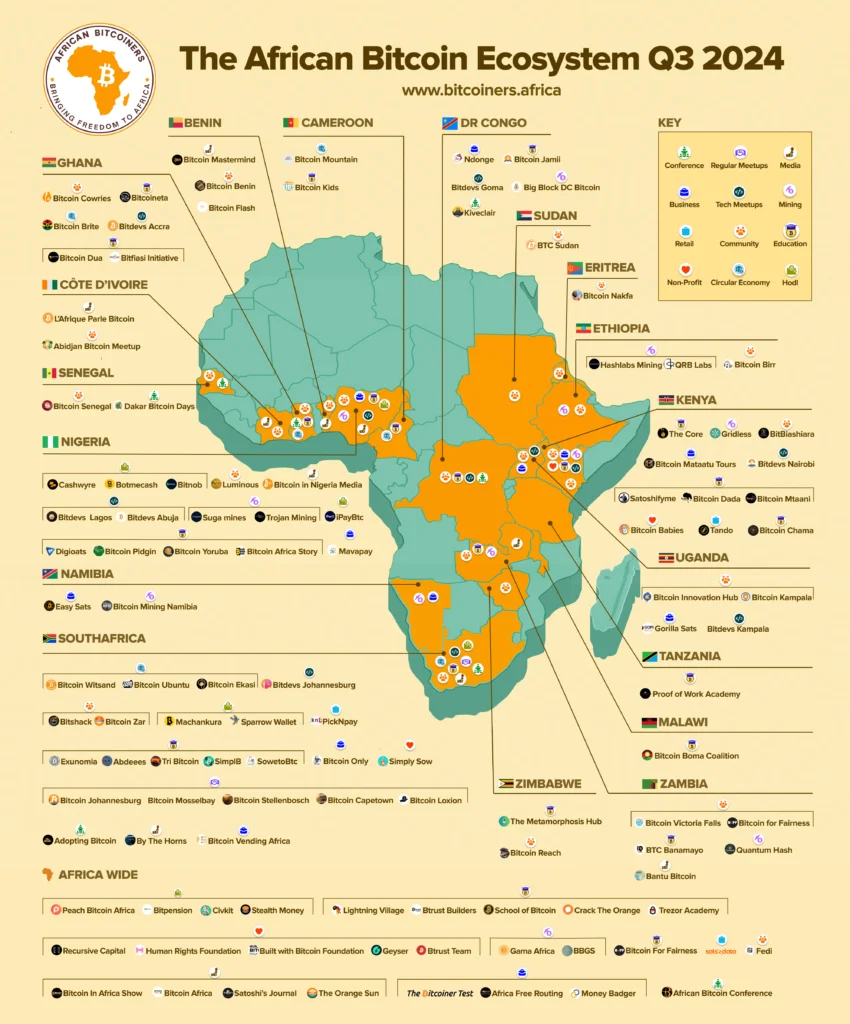The African Bitcoin ecosystem has expanded beyond anyone’s imagination, stretching from retail solutions tailored to cater for natives to education programs providing financial education and programming skills to our growing youth.
In Brief
-
The African Bitcoin ecosystem is thriving across payments, mining, education, and community-building, pushing Bitcoin beyond speculation into real-world African use cases.
-
Youth-led initiatives, localized education platforms, and women-led communities are central to growing developer talent and financial literacy in the region.
-
By turning stranded energy into Bitcoin and enabling peer-to-peer payments, Africa is creating a sovereign, inclusive financial future built on decentralization.
Change is here, and Africa is consistently proving how adopting Bitcoin goes beyond traditional trading.
This article dives into exploring the different ways Bitcoin has etched its name in Africa’s ecosystem, gaining inspiration from the Africa Bitcoin Ecosystem Infographic Q3 2025.
The African Bitcoin Ecosystem, The Foundation of our Global Adoption.
Bitcoin, what was once considered a global scam, soon evolved into digital gold after surpassing the $100,000 mark.
However, in Africa, the technology has resulted in various vibrant local crypto economies thriving on digital asset use cases over the years.
Bitcoin, the foundation of decentralization, gave many innovators the inspiration they required to stretch its applications beyond cryptocurrency.
Soon, Decentralized finance became the next iteration of finance, providing superior, safer and cheaper alternatives to banks.
CHECK OUT:Flutterwave Slashes Staff in Key African Markets Amid Restructuring Drive
This later extended into development, demand and experimentation throughout other sectors.
The result is vibrant local crypto economies tailored to show how Bitcoin can transform the livelihood of Africans from each sector.
Let’s dive into how vast the African Bitcoin Ecosystem truly stretches.
Beyond Trading: Bitcoin as a Payment Revolution
What makes Bitcoin thrive in Africa isn’t its high value but rather its accessibility, safety and preferred alternative as cross-border payment solutions.
The bitter truth is that Africa was left behind by most financial institutions, causing the continent to have the highest number of unbanked populous worldwide.
Contributing to this decline was the high inflationary pressure and liquidity crises that many regions faced.
Hence when local innovators came along with Bitcoin offering a lifeline which enables peer-to-peer transactions, remittances and commerce.
In Kenya, Tando, bitcoin-powered payment solutions, breaks down the complexities of the digital asset. Think Mpesa but with Bitcoin offering a cheaper, faster alternative. Merchants and individual users can pay bills and even receive salaries in BTC.
However, the practicability of BTC goes beyond just transacting.
Platforms like Bitsacco and Mulastack show that Saccos, or “Chamas[Swahili term best known in East Africa]”, can be powered by Bitcoin. These platforms provide solutions for non-tech demographics to understand that Bitcoin can be a better alternative for saving and investing.
With the growing number of Bitcoin payments, infrastructure builds the backbone of the African Bitcoin Ecosystem.
CHECK OUT:Bitcoin Literacy Program Opens for African Women: Apply by June 26
Hardware Wallet and Sparrow Wallet provide user-friendly tools for storing and spending BTC, reducing reliance on volatile local currencies.

Additionally, the growing use of this digital gold led to innovations like Bitcoin Vending Africa, an organization facilitating BTC ATMs and off-ramp services. Bitcoin for Business also contributed by bridging the gap between modern business and how BTC can overhaul transactions.
Education: Igniting the Next Generation
Bitcoin adoption in Africa wouldn’t be possible without the surge in educational initiatives that equip youth with technical and financial literacy.
The continent currently has tech-hungry youth who are eager to develop new solutions, but lack the resources and guidance to grow.
Bitcoin education programs and communities like BitcoinKids, Satoshi Learners, and Bitcoin Masterminds have directly influenced the growth of developers and traders in Africa.
In Nigeria, Bitdevs Lagos and BitDevs Abuja host coding workshops and hackathons focused on lightning-node solutions.
Meanwhile, Bitcoin Pidgin offers online education on Bitcoin in Nigeria’s native language, fostering understanding in its underserved population. Similarly, Satoshify Me does a similar approach but in Swahili for East Africa.
Popular brands empowering women like Bitcoin Dada alongside DadaDeves are teaching African women how Bitcoin offers an alternative.
Mining: Turning Energy into Empowerment
Bitcoin mining cooperatives are still thriving in Africa, forming the foundation of the entire ecosystem.
Despite what many might think about its legacy approach, various initiatives beg to differ. Africa’ is still the world’s foremost resource region, and its power generation is nothing to scoff at.
Firms like Torjan Mining, Bitcoin Mining Namibia, and Ethipia’s QRB Labs are handling and monetizing stranded or excess energy into Bitcoin mining.
This is an added advantage, ensuring no energy spillage or waste while also providing a revenue stream. Furthermore, with the negative global look on Proof-of-Work, many international regions look to Africa to offer mining grids.
The Bigger Picture: Community as Catalyst
Bitcoin adoption in Africa and the development of local crypto economies wouldn’t be possible without community collaboration and localized problem-solving.
These days, crypto events and meetups are highly sought after, curating Africa’s dispersed crypto community.
Meetups like Bitcoin Togo, Bitcoin Senegal, Abidjan Bitcoin Meetup, BitDevs Nairobi and others serve as hubs for knowledge-sharing and collective action.
The African Bitcoin Mining Summit and Dakar Bitcoin Days bring together miners, developers, and entrepreneurs to address local issues and how best to use Bitcoin to solve them.
The Verdict: Sovereignty Over Speculation
These communities pioneer a circular economy with BTC at its centre while also promoting education, reshaping Bitcoin from its current state.
Initially, Bitcoin was never meant to follow its current trajectory. While its value increase has backed bitcoin adoption in Africa and the creation of local crypto economies, its reason for being was to redefine finance.
These communities, initiatives, projects and hubs exemplify these initiatives, showing how Bitcoin is a viable alternative in Africa.
By prioritizing payments, education, and scalable infrastructure like the Lightning Network, the continent is forging a future where financial freedom is not a privilege but a right. As the Q3 2025 infographic illustrates, Bitcoin’s story in Africa is far from over—it’s just beginning.
